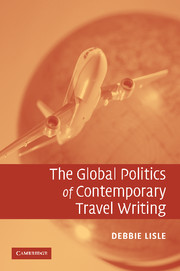Book contents
- Frontmatter
- Contents
- List of illustrations
- Preface
- ‘Travelogue’
- 1 Introduction: the global imaginary of contemporary travel writing
- 2 Between fact and fiction: the generic boundaries of travel writing
- 3 The cosmopolitan gaze: rearticulations of modern subjectivity
- 4 Civilising territory: geographies of safety and danger
- 5 Looking back: utopia, nostalgia and the myth of historical progress
- 6 Engaging the political: contemporary travel writing and the ethics of difference
- Bibliography
- Index
3 - The cosmopolitan gaze: rearticulations of modern subjectivity
Published online by Cambridge University Press: 22 September 2009
- Frontmatter
- Contents
- List of illustrations
- Preface
- ‘Travelogue’
- 1 Introduction: the global imaginary of contemporary travel writing
- 2 Between fact and fiction: the generic boundaries of travel writing
- 3 The cosmopolitan gaze: rearticulations of modern subjectivity
- 4 Civilising territory: geographies of safety and danger
- 5 Looking back: utopia, nostalgia and the myth of historical progress
- 6 Engaging the political: contemporary travel writing and the ethics of difference
- Bibliography
- Index
Summary
I was reminded of the damage that liberals can do
Graham GreeneGraham Greene is a symbolic figure for contemporary travel writers. As one of the first modern writers to publish both novels and travelogues, he serves as a model for ‘cross-over’ authors like Paul Theroux, Jonathan Raban and Pico Iyer. Many of Greene's novels are infused with exotic myths: for example, The Quiet American is a story about love, loss and moral action which is brought into relief by its setting in pre-war Vietnam. Greene also translates larger moral questions through an exotic lens in his travelogues – in Liberia he thinks of lost innocence (Journey without Maps, 1936) and in Mexico he thinks of faith and violence (The Lawless Roads, 1939). Greene's travelogues are certainly significant for their exotic registers, but they also inaugurate a new era of introspection for the travel writer. Countering Todorov's claim that modern travelogues record the ‘fleeting’ impressions of authors, Greene's writing suggests that travel writers are profoundly self-reflexive. As Blanton suggests, Greene's travelogues are ‘the real beginning of heightened subjectivity in the genre’ – a subjectivity which resonates deeply when posed against exotic, foreign and often hostile locations. This chapter examines the condition of self-reflexivity in contemporary travel writing and asks how it shapes the cross-cultural encounters between travel writers and those they write about.
- Type
- Chapter
- Information
- The Global Politics of Contemporary Travel Writing , pp. 68 - 133Publisher: Cambridge University PressPrint publication year: 2006

